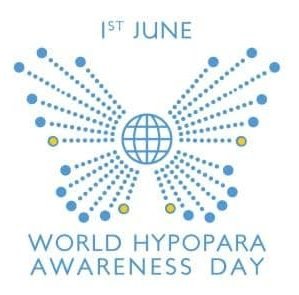Decoding Hypoparathyroidism: Unravelling the Signs, Symptoms, and Affected Individuals.
It’s world Hypopara Awareness Day on 1st June 2023
What is Hypopara?
Hypoparathyroidism, also known as "hypopara," is a rare hormonal condition that can either be temporary or permanent. Unfortunately, permanent hypopara cannot be cured. The condition occurs when the parathyroid glands in the neck are not working or not producing enough parathyroid hormone (PTH). This can result in low blood calcium levels, which is also known as hypocalcaemia.
If left untreated, hypocalcaemia can be a serious condition. Therefore, careful management and regular monitoring of calcium levels are essential. (Parathyroid UK, n.d.). It also causes high levels of phosphorus in the blood which is known as hyperphosphataemia. (NHS, 2018).
How do you get Hypopara?
The main reason for hypoparathyroidism is when the parathyroid glands in the neck are harmed or destroyed during neck surgery. According to one survey, about 80% of patients contracted hypopara due to this reason. The condition can either be temporary or permanent. In addition to this, the immune system can also cause damage to the glands (autoimmune). Some people can be born with hypopara (congenital), while others may develop it later in life due to a genetic cause. Sometimes, the cause of the condition is unknown (idiopathic). (Parathyroid UK, n.d.).
There are no exact figures available for the prevalence of hypoparathyroidism in the UK. However, a study conducted in Denmark estimated that 27 out of 100,000 people have the condition. Hypopara appears to be more common in women than men, and the number of cases resulting from neck surgery is increasing, possibly due to the rising number of thyroid cancer cases. (Parathyroid UK, n.d.).
Signs and symptoms of Hypopara
People with hypoparathyroidism of any type often experience symptoms resulting from low blood calcium levels, also called hypocalcaemia. However, low levels of PTH by themselves do not cause any symptoms.
The symptoms of this condition can differ greatly among individuals. While some people may not experience any symptoms once they are on proper medication, others may experience mild to severe symptoms. The levels of calcium in the body can vary depending on the daily routine and needs, which can also change gradually over time. Therefore, regular monitoring of calcium levels is necessary throughout life to prevent any emergency situations.
If left untreated, low calcium levels can cause tetany, a condition that leads to a range of symptoms that can worsen over time. (Parathyroid UK, n.d.).
The following are symptoms of tetany –
Sudden exhaustion
Tingling/numbness in hands or feet
Dizziness
‘Brain fog’
Blurred vision
Irritability
Sensitivity to sounds
Diarrhoea
Anxiety
Extreme weakness
Chills
Varying degrees of ‘inner trembling’
Cramps
It is also important to note that calcium levels can also swing too high if too much medication is given. This would result in hypercalcaemia.
(Parathyroid UK, n.d.).
The NHS list the following signs and symptoms of hypoparathyroidism -
“a tingling sensation (paraesthesia) in your fingertips, toes and lips
twitching facial muscles
muscle pains or cramps, particularly in your legs, feet or tummy
tiredness
mood changes, such as feeling irritable, anxious or depressed
dry, rough skin
coarse hair that breaks easily and can fall out
fingernails that break easily”
(NHS, 2018).
When hypoparathyroidism is a complication of surgery, symptoms can begin within a few hours to several days after the surgery. Sometimes, symptoms may start even later. If you start feeling unwell, it is important to contact your hospital immediately. In some cases, this condition can be temporary. However, if you continue to experience symptoms while on medication for more than six months, your condition is likely to be permanent.
Diagnosing non-surgical hypoparathyroidism can take a longer time as it is even rarer, and the symptoms are not specific to hypocalcaemia. Therefore, identifying hypopara can be challenging and it is frequently misdiagnosed. Some people may have been living with unrecognized hypopara for years until a routine calcium blood test is done. Your GP is usually the first point of contact who will assess your symptoms and conduct a simple blood test to measure your blood calcium levels.
If the calcium level is unusually low, further blood tests may be required to check the functioning of the parathyroid glands, phosphate level, kidney function, magnesium levels, and vitamin D levels. If hypoparathyroidism is suspected, all patients, whether surgical or not, should be referred to an endocrinologist who specializes in hormone-related conditions for lifelong care. As this is a rare condition, it is ideal to consult a specialist in calcium or bone metabolism. (Parathyroidism, UK, n.d.).
Treatments for hypopara
It's important to treat hypopara, and the treatment is lifelong. The current treatment involves taking pills containing active vitamin D and calcium, but this can lead to other health problems. New treatments are being tested in clinical trials.
If you have temporary hypopara after surgery, you'll be able to stop taking medication once your parathyroid glands start working again. You'll need the following pills:
Active Vitamin D: available only by prescription, alfacalcidol or calcitriol are potent and help the body absorb calcium from your diet. They're different from the over-the-counter Vitamin D3 capsules.
Vitamin D3: you need good levels of this vitamin, which can be checked twice a year. A deficiency can cause bone pain, weakness, fatigue and affect your calcium stability. You can get these vitamins with a prescription or over the counter.
Magnesium: this mineral is vital for the absorption of calcium and vitamin D, and helps prevent cramps. It also helps keep calcium in bones and out of soft tissue. Regularly monitoring magnesium levels is important because low magnesium levels can cause low calcium levels.
Chewable calcium supplements: they temporarily boost your calcium level, but the effect lasts only a few hours. You should split your tablets throughout the day because the body can absorb only 500mg of calcium at a time. You can even take a quarter or half a tablet if that works for you. In some cases, taking additional calcium tablets may be enough to manage your condition, but most people will not achieve adequate calcium control with calcium supplements alone. It's recommended to take a maximum of 2 tablets a day to avoid kidney problems. Many people prefer to get their calcium from food and keep tablets for emergencies.
Levothyroxine: if you had your thyroid gland or part of it removed or have low thyroid hormone levels, you need thyroid hormone replacement. You should take this at least 2 hours apart from calcium and magnesium medication if possible. Thyroid hormone levels need to be regularly monitored. (Parathyroidism, UK, n.d.).
-
Parathyroid UK. (n.d.). Hypopara: A quick guide. [online] Available at: https://parathyroiduk.org/hypoparathyroidism/.
NHS (2018). Hypoparathyroidism. [online] nhs.uk. Available at: https://www.nhs.uk/conditions/hypoparathyroidism/.

